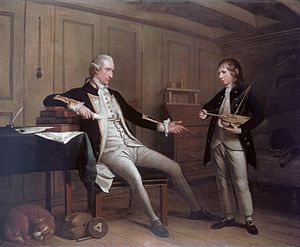John Bentinck facts for kids
Quick facts for kids
John Albert Bentinck
|
|
|---|---|

Captain John Bentinck (1737–1775) and his son, William Bentinck (1764–1813)
|
|
| Born | 29 December 1737 |
| Died | 23 September 1775 (aged 37) |
| Allegiance | |
| Service/ |
|
| Years of service | 1752 – 1773 |
| Rank | Captain |
| Commands held |
|
| Battles/wars | Seven Years' War |
| Relations | William Bentinck (son) |
John Albert Bentinck (born December 29, 1737 – died September 23, 1775) was an important figure in British history. He was a skilled officer in the Royal Navy, a clever inventor, and a politician. He served in the British Parliament from 1761 to 1768.
Contents
Who Was John Albert Bentinck?
John Albert Bentinck came from a well-known family called the Bentincks. His father, William, Count Bentinck, was the son of the first Earl of Portland. His mother was Charlotte Sophie. John Albert was their second son.
John Albert Bentinck joined the Royal Navy when he was quite young.
In August 1752, he was a volunteer on a ship called HMS Centurion. He visited Lisbon, Portugal, but soon returned home. In 1753, he became a midshipman on HMS Penzance, a 44-gun ship. He sailed to Newfoundland that summer.
Fighting in the Seven Years' War
In 1758, Bentinck was part of a battle where the British captured a French ship called Raisonnable. He was then given command of a small ship called HMS Fly. With the Fly, he helped protect troops landing at St Malo during a raid.
While stationed near Emden, he had a misunderstanding with a superior officer. The issue was resolved, and he was promoted. On October 17, 1758, he became captain of the frigate HMS Dover. A frigate is a type of warship.
In 1759, he took command of another frigate, HMS Niger. In 1760, he bravely fought a much larger French warship, the 74-gun Diadème. After repairing his ship, he captured a French privateer (a privately owned warship) called Jason. Later, he captured another French ship, the Epreuve. He stayed on the Niger until the Seven Years' War ended in 1762.
Later Commands
After the war, Bentinck did not have a ship for a few years. In 1766, he was given command of the 74-gun HMS Dragon at Portsmouth. He held this command for three years. In 1770, he took command of HMS Centaur, another 74-gun ship. This was his last command, which he held for three years. He passed away two years later, in 1775.
A Clever Inventor
John Albert Bentinck was very good at inventing things, especially for ships. He made many useful improvements for the navy.
Improving Ship's Pumps
He greatly improved the chain pump used on ships. These pumps were vital for removing water from the ship's bottom. His changes were so important that he is often credited with inventing the modern chain pump.
New Sailing Gear
Bentinck also invented "Bentinck shrouds," which helped support a ship's masts. He created the "Bentinck boom," which made it easier to change a ship's direction. Finally, he developed a special triangular mainsail, often used in storms, which became known as "the Bentinck sail."
Because of his clever inventions, he was chosen to be a Fellow of the Royal Society on June 20, 1765. This is a very respected group of scientists.
Serving in Parliament
In the 1761 general election, John Albert Bentinck was elected to parliament. He represented the town of Rye, which was one of the Cinque Ports. He kept his seat in parliament until the 1768 election.
His Family Life
John Albert Bentinck was also a count of the Holy Roman Empire. In 1763, he married Renira van Tuyll van Serooskerken. They had five children: two boys and three girls. Their oldest son, William Bentinck (1764–1813), also joined the Navy and became a vice-admiral.
See also
- HMS Bentinck (K314)
 | George Robert Carruthers |
 | Patricia Bath |
 | Jan Ernst Matzeliger |
 | Alexander Miles |

